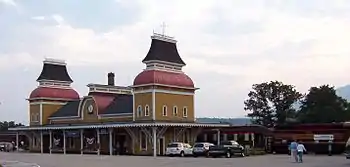North Conway, New Hampshire
North Conway is a census-designated place (CDP) and village in eastern Carroll County, New Hampshire, United States. The population was 2,349 at the 2010 census.[1] A year-round resort area, North Conway is the largest village within the town of Conway, which is bounded on the east by the Maine state line. The White Mountain National Forest is to the west and north. Conway is home to Cathedral Ledge (popular with climbers), Echo Lake State Park, and Mount Cranmore. North Conway is known for its large number of outlet shops.
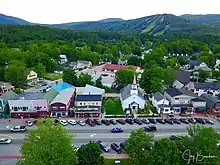
North Conway, New Hampshire | |
|---|---|
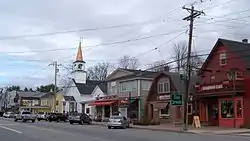 Buildings in downtown North Conway | |
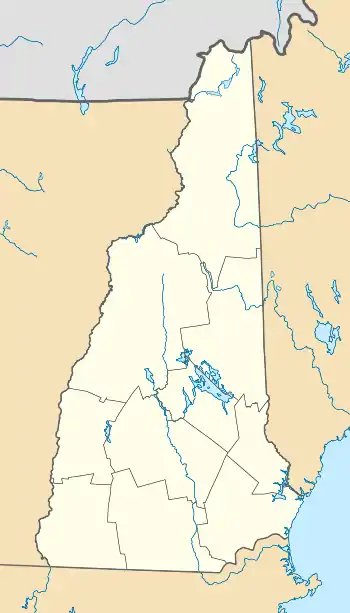 North Conway  North Conway | |
| Coordinates: 44°3′11″N 71°7′41″W | |
| Country | United States |
| State | New Hampshire |
| County | Carroll |
| Town | Conway |
| Area | |
| • Total | 4.3 sq mi (11.2 km2) |
| • Land | 4.3 sq mi (11.1 km2) |
| • Water | 0.04 sq mi (0.1 km2) |
| Elevation | 525 ft (160 m) |
| Population (2010) | |
| • Total | 2,349 |
| • Density | 549/sq mi (211.9/km2) |
| Time zone | UTC-5 (Eastern (EST)) |
| • Summer (DST) | UTC-4 (EDT) |
| ZIP code | 03860 |
| Area code(s) | 603 |
| FIPS code | 33-53860 |
| GNIS feature ID | 0872395 |
History
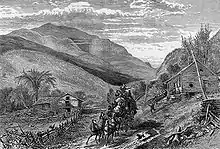
Chartered in 1765 by Colonial Governor Benning Wentworth, the town is named for Henry Seymour Conway, ambitious son of a prominent English family, who was elected to the House of Commons at age 20, fought at Culloden, and became Secretary of State. Early settlers called the area Pequawket (known colloquially as Pigwacket), adopting the name of the Abenaki Indian village which stretched down the Saco River to its stockaded center at Fryeburg, Maine.
North Conway is in the White Mountains, with Mount Washington to the northwest. The rugged terrain became popular in the 19th century with artists. Their paintings were known collectively as White Mountain art, which in turn attracted tourists to the area, particularly after the Portsmouth, Great Falls & Conway Railroad extended service in 1872 to North Conway. In 1874, the line built a Second Empire depot, designed by Nathaniel J. Bradlee. In 1932, "snow trains" began carrying enthusiasts to "the birthplace of American skiing," as North Conway is known.
Increasing automobile travel brought the decline of trains. The railroad, then part of the Boston & Maine, abandoned passenger service to the area in 1961 and freight service in 1972. Subsequently, the Conway Scenic Railroad was established. Today, the line offers visitors a tour of the region, including Crawford Notch. The station is listed on the National Register of Historic Places.
In the late 1980s, the White Mountain Airport closed and was redeveloped as a large outlet mall called Settlers' Green Outlet Village. Continued growth through the 1990s and 2000s in North Conway and the villages nearby made Conway the most populous community in Carroll County. Traffic congestion led to an overhaul of the road system, including widening Route 16 through North Conway village and constructing a road parallel to Route 16 to allow traffic to move between Redstone and Intervale uninterrupted. A bypass of the area is being developed.
North Conway remains a popular destination due to its shopping, recreation, and attractions.
Recreation
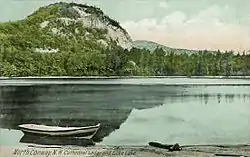
North Conway and its surrounding towns offer hiking in the White Mountain National Forest. The area is a major rock climbing destination in the northeastern United States,[2] particularly Cathedral Ledge in Echo Lake State Park. The 500-foot (150 m) cliff overlooks Echo Lake and North Conway from the west. Unlike nearby White Horse Ledge, another rock climbing site, Cathedral Ledge has an automobile road to the summit, which provides fine views of the Saco River Valley.
In late September through early October, tourists arrive to see the autumn foliage on the surrounding mountains and forests. The Conway Scenic Railroad features train rides that leave from the village's Victorian station. In the winter, the village is the nighttime destination for skiers visiting the area resorts, including North Conway's own Cranmore Mountain as well as nearby Attitash Resort, Black Mountain and Wildcat Mountain.
North Conway is home to the Green Hills Preserve. The preserve encompasses several mountains in the Mt. Washington Valley, and is a low north-south running mountain ridge flanking the east side of Route 16. The preserve includes Rattlesnake Mountain, Middle Mountain, Peaked Mountain, and Black Cap mountain.[3][4][5][6]
Geography
North Conway is located at 44°3′6″N 71°7′22″W (44.051534, -71.122752),[7] in the northern part of the town of Conway.
According to the United States Census Bureau, the village, a census-designated place (CDP), has a total area of 4.3 square miles (11.2 km2), of which 4.3 square miles (11.1 km2) is land and 0.039 square miles (0.1 km2), or 1.29%, is water.[1] North Conway is drained by the Saco River.
Demographics
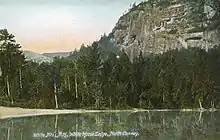
As of the census of 2010, there were 2,349 people, 1,105 households, and 547 families residing in the CDP. The population density was 546.3 people per square mile (211.9/km2). There were 1,804 housing units, of which 699, or 38.7%, were vacant. 551 of the vacant units were seasonal or vacation properties. The racial makeup of the CDP was 94.7% White, 0.5% African American, 0.4% Native American, 2.0% Asian, 0.1% Native Hawaiian or other Pacific Islander, 0.6% some other race, and 1.7% from two or more races. Hispanic or Latino of any race were 1.6% of the population.[8]
There were 1,105 households, out of which 23.3% had children under the age of 18 living with them, 33.1% were headed by married couples living together, 11.4% had a female householder with no husband present, and 50.5% were non-families. 39.9% of all households were made up of individuals, and 12.8% were someone living alone who was 65 years of age or older. The average household size was 2.07, and the average family size was 2.73.[8]
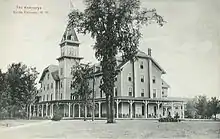
In the CDP, the population was spread out, with 18.6% under the age of 18, 8.4% from 18 to 24, 26.8% from 25 to 44, 29.1% from 45 to 64, and 16.8% who were 65 years of age or older. The median age was 42.1 years. For every 100 females, there were 99.9 males. For every 100 females age 18 and over, there were 92.5 males.[8]
For the period 2007–11, the estimated median annual income for a household in the CDP was $40,804, and the median income for a family was $46,832. Male full-time workers had a median income of $31,764 versus $23,859 for females. The per capita income for the CDP was $21,664. About 12.1% of families and 21.9% of the population were below the poverty line.[9]
Notable people
- Ed Ashnault, college football and basketball coach; grew up in North Conway.[10]
- Benjamin Champney, artist
- Gordon Clapp, actor
- E. E. Cummings, 20th century poet; summer resident; died (of a stroke) in North Conway, on September 3, 1962
- Jigger Johnson, logger
- Jeff Locke, Major League Baseball player, born in North Conway and raised in neighboring Redstone
- Helen Bigelow Merriman, 19th century artist and philanthropist born in North Conway; she helped found Memorial Hospital, and served as president of the public library
- Nathan W. Pease, photographer who lived and worked capturing images of area sites
- Johann "Hannes" Schneider, Austrian ski instructor of the first half of the twentieth century and founder of the Arlberg Technique for teaching skiing; ran ski school in North Conway
- John Shea, actor, producer and director
- David A. Shirley, chemist
- Leanne Smith, two-time Olympian and World Cup alpine ski racer
- Martha Pearson Smith (1836-?), poet, musician, temperance activist
- Julia Ruth Stevens, daughter of Babe Ruth[11]
Sites of interest
- Echo Lake State Park
- Mount Washington Valley Children's Museum
- Mount Washington Valley Theatre Company
- Cranmore Mountain
Sites on the National Register of Historic Places:
See also
North Conway is a village within the town of Conway. The other villages within Conway are:
References
- "Geographic Identifiers: 2010 Demographic Profile Data (G001): North Conway CDP, New Hampshire". U.S. Census Bureau, American Factfinder. Archived from the original on February 10, 2020. Retrieved April 3, 2013.
- "Cathedral and Whitehorse Ledges". Dartmouth Outing Club. Retrieved June 22, 2010.
- "Black Cap". Boy Scout Troop 49. Lynnfield, Massachusetts. 2002-07-24.
- "Pudding Pond Loop Nature Walk". Open World Explorers.
- "Green Hills Preserve grows by 1,300 acres". Conway Daily Sun. 2014-11-13.
- "Freedom of the Hills: Black Cap Mountain". Bridgton News. 2012-05-17.
- "US Gazetteer files: 2010, 2000, and 1990". United States Census Bureau. 2011-02-12. Retrieved 2011-04-23.
- "Profile of General Population and Housing Characteristics: 2010 Demographic Profile Data (DP-1): North Conway CDP, New Hampshire". U.S. Census Bureau, American Factfinder. Archived from the original on February 10, 2020. Retrieved April 3, 2013.
- "Selected Economic Characteristics: 2007-2011 American Community Survey 5-Year Estimates (DP03): North Conway CDP, New Hampshire". U.S. Census Bureau, American Factfinder. Archived from the original on February 12, 2020. Retrieved April 3, 2013.
- Plymouth State Athletics: 2002 HOF Inductees. Accessed May 10, 2008
- "Babe Ruth's Daughter, Julia Ruth Stevens, Represents TW Museum at 2008 Eastern League All-Star Game". www.tedwilliamsmuseum.com. Retrieved 2011-02-02. Quote: "Years of living in North Conway, NH, and watching the Red Sox on local TV have made her a true Boston fan."
External links
| Wikimedia Commons has media related to North Conway, New Hampshire. |
| Wikivoyage has a travel guide for North Conway. |
